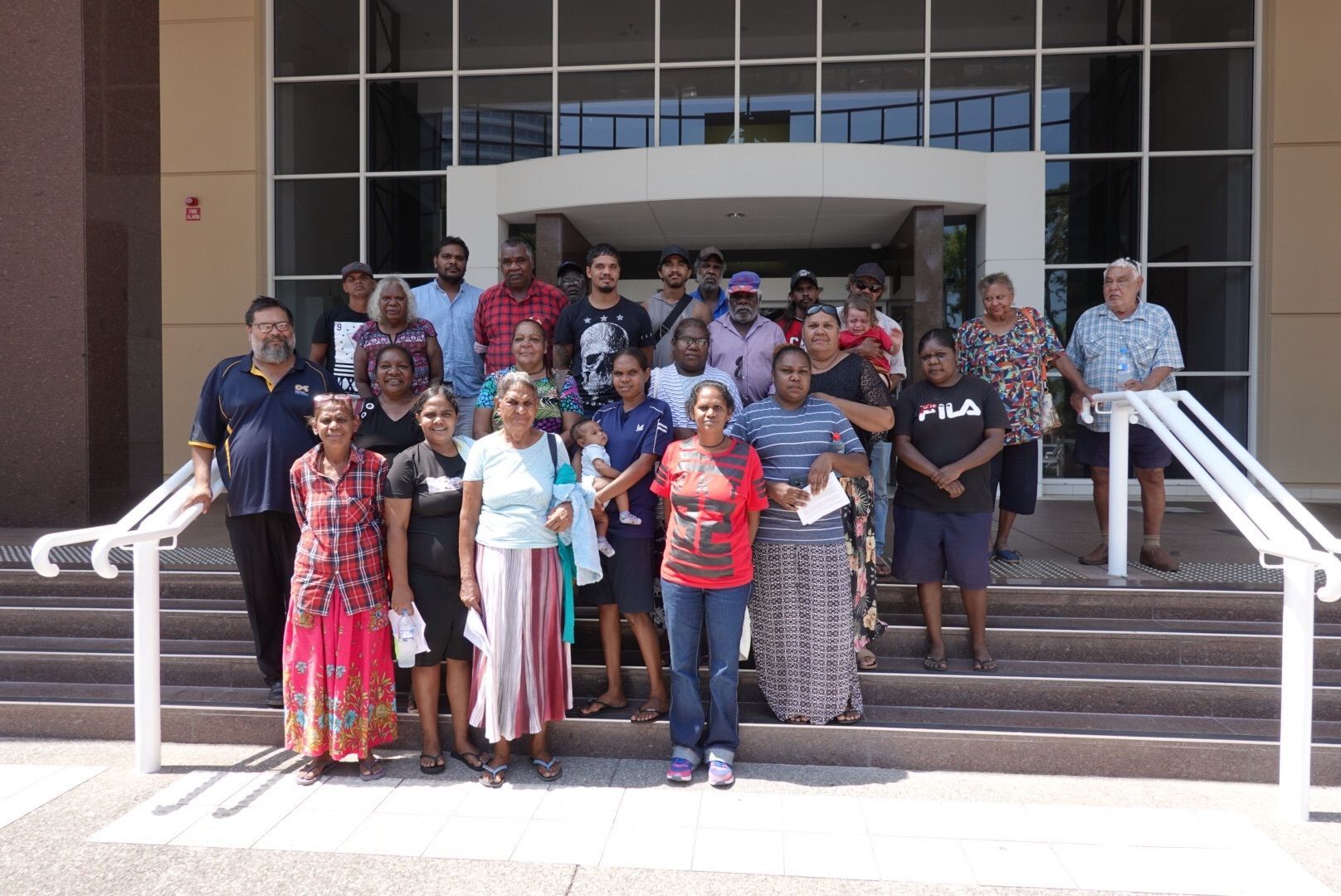High Court comes to Darwin: Valuing native title in dollars
In September 2018, the Timber Creek native title compensation claim – one of the biggest test cases in Indigenous rights since Mabo – brought the High Court of Australia to the Northern Territory for the first time in its 116-year history.

Timber Creek mob at High Court, 5 September 2018.
The appeal was heard on 4, 5 and 6 September and we await the Court’s decision in the coming months.
The claim group is the Ngaliwurru and Nungali peoples who are members of the estate groups Makalamayi, Wunjaiyi, Yanturi, Wantawul and Maiyalaniwung – the Traditional Owners of the town site of Timber Creek, in the Victoria River District of the Northern Territory.
The claim is for compensation for the loss of native title rights that have been ‘extinguished’ by the crown acquiring land without the native title holders’ consent. The Timber Creek claim relates to three kinds of loss: the market value of the land, interest over time on the market land value, and a ‘solatium’ amount for the personal, spiritual pain of losing rights to sacred sites and country.
Around 40 Traditional Owners of Timber Creek travelled 600km or more to attend the appeal. Claimant Chris Griffiths was among them, telling the ABC outside Court: “This court hearing, it makes us feel sad, it makes us happy and it also makes us proud because we know that our message is getting across, that they are understanding how important [it is that] we are connected to country and the land.”
The right to native title compensation comes from the Australian Constitution’s requirement that any property owner must be compensated on ‘just terms’ when the Crown acquires their property.
In 1992, Mabo v Qld (No 2) first considered how the Constitutional right to compensation on just terms applies to native title. The Court decided that the Racial Discrimination Act (‘RDA’) requires compensation to be paid to native title holders in the same way it must be paid to any other property owner, but only for native title acquired or affected after the RDA commenced in 1975.
The right to claim compensation is now contained in section 51 of the Native Title Act .
The claim relates to 127 hectares of land now within Timber Creek, but the social and cultural effect of those developments on the native title holders relates to a much larger region of country. In the trial hearing in 2016, Federal Court Justice Mansfield heard evidence from claim group members in and around Timber Creek, including restricted evidence from senior men, in a confidential, men-only session.
A key question in the appeal is whether native title should be valued equally to freehold property (eg a house or a commercial block), or if it is less valuable because it can’t be sold or mortgaged (it is ‘inalienable’). Part of that question considers whether the ‘non-exclusive’ native title taken from Ngarliwurru and Nungali peoples (that is, native title that co-existed with pastoral land) has a lower value than ‘exclusive’ native title, where native title holders can legally prevent others from entering the land.
The trial judge awarded a total of $3.3 million dollars compensation across the three categories of loss in 2016. The Full Federal Court, on appeal, reduced that to almost $2.9 million in 2017. The claim is for almost $5 million. A compensation determination provides a once-off amount to the claim group.
“It’s not about the money, it’s about the land and the land is most important because we’ve got important sacred sites,” said claimant Lorraine Jones. “When you see damages happen to your land, you feel your tummy, your hurt, like you’re emotionally hurt inside, you don’t show it on the outside, but it’s hurting you on the inside.”
Australia is watching the Timber Creek case, which will provide a precedent for future compensation claims, which may relate to towns or other developments, like mines, established without consent of the native title holders from 1975. Due to the national significance of the case, the governments of Western Australia, Queensland and South Australia have joined the case as ‘intervenors’, supporting the arguments of the NT and Commonwealth. Two other native title representative bodies from WA also joined, supporting the claim group’s arguments.
Sadly, Chris and Lorraine’s fathers, Mr A. Griffiths and Mr J. Jones, two very senior members of the claim group, passed away before the case was heard in the High Court. The strength of the compensation claim presented is a testament to their knowledge, the losses suffered when native title was taken, and the opportunities that their people will realise through their fight for compensation for the present and future generations.
“It’s really important. Not only for me, not only for Lorraine but both of our fathers. They’re not here today. But we’re here and we’re here to finish off the job that they’ve done,” said Chris.
